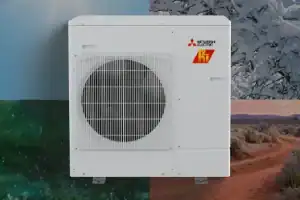
Good news for homeowners! The Federal Inflation Reduction Act of 2022 provides significant tax credits for updating your home with energy-efficient HVAC systems via the Energy Efficient Home Improvement Credit. This means you can cut costs while boosting your home’s energy efficiency. Qualifying HVAC equipment includes air-source heat pumps, central air conditioners and gas furnaces, among others (see below).
Unfortunately, there is a catch to this offer. Originally, this federal HVAC tax credit was good for equipment upgrades made between 2023 and 2032. However, in the latest budget, Congress has terminated the Energy Efficient Home Improvement Credit, effective December 31, 2025.
So, if you’ve been thinking about upgrading your HVAC system, installing a new air-source heat pump or a new gas furnace, contact Northeast PA’s leading heating and cooling experts, AC&R Services, at 570.788.2427 to get it done in 2025 to take full advantage of the tax credit.
So, just how much can I qualify for?
HVAC systems and equipment included under the federal act:
- Heat Pumps: Obtain a credit of up to $2,000 for installing an electric or natural gas heat pump. To qualify in 2025, the unit must be identified as ENERGY STAR Most Efficient.
- Central Air Conditioners: Receive a credit of up to $600 for new central AC units. For eligibility this year, a split system must have a SEER2 of at least 17.0 and an EER2 of at least 12.
- Natural Gas, Propane or Oil Furnaces: You can qualify for credit of up to $600 for furnaces with an Annual Fuel Utilization Efficiency (AFUE) of 97 percent or higher.
- Geothermal Heat Pumps: Homeowners can meet the requirements for this credit if they meet ENERGY STAR Most Efficient standards.
What is a tax credit?
Frankly, a tax credit lowers what you owe. If, for example, you owe the IRS $2,000 and are eligible for a $1,200 credit, you only owe $800. Put simply, it puts money back into your pocket. In other words, it’s not identical to a rebate that arrives in the mail. A tax credit is applied against your tax liability, lowering the amount you owe Uncle Sam.
Key details for claiming your federal tax credits
- Documentation: You must obtain a Product Identification Number (PIN) from the manufacturer for qualifying products installed in 2025.
- Form 5695: The credits must be claimed when filing IRS Form 5695 with your 2025 tax return.
- Annual Cap: You can claim up to a collective maximum of $3,200 annually ($2,000 for heat pumps and heat pump heating, plus $1,200 for other improvements).
Important considerations
- Act by the deadline: Keep in mind that these tax credits expire on December 31, 2025, making this a critical several months for HVAC system upgrades.
- Confirm eligibility: Verify with the manufacturer and your installer (e.g., AC&R Services) that the specific equipment you choose meets the efficiency requirements. The ENERGY STAR website is a handy source for locating qualifying products.
- Look for other incentives: Besides these federal tax credits, various states, localities and utility firms provide rebates that can be combined with these federal benefits.
- Consult a professional: The professionals at AC&R Services suggest that you consult with a qualified tax professional to make sure your project and filing are eligible for the maximum benefits.
Additional products that may qualify
While AC&R Services’ focus is logically on HVAC tax credits, we want to inform you of additional tax credit options under the law for making your home more energy efficient. Refer to the ENERGY STAR website for specific products and project requirements.
Other projects may include:
- Heat pump;
- Upgrading your insulation, caulking and sealing
- Installing energy-efficient windows and doors
- Installing a natural gas furnaces.
Keep in mind, a well-insulated home equipped with energy-efficient windows and doors, combined with an energy-efficient HVAC system can cut your heating and cooling bills even more.
Residential Energy Credits
The tax credits described above aren’t the only credits obtainable for homeowners to make their homes more energy efficient. AC&R Services wants you to know that Residential Clean Energy credits are worth 30 percent of the cost of installing clean energy equipment and have no annual or lifetime dollar credit.
Qualified equipment includes solar panels (photovoltaic), solar heating (with specific certifications), wind turbines, geothermal heat pumps, battery storage technology, and fuel cells (with a $500 limit for each half-kilowatt capacity).
Remember, just as with the federal tax incentives, you can claim the full value of these residential energy credits until December 31, 2025, when you file your 2025 taxes if you installed eligible equipment.
Who is eligible for tax credits?
The credits are offered only for specific improvements made to the principal residence, described as the home where you live most of the time. The home must be in the United Sates and can include a house, houseboat, mobile home, cooperative apartment, condominium or a manufactured home.
Moreover, it needs to be a standing home that you improve or add onto. However, the credit does not apply to a newly built home. What’s more, you may not claim the credit if you’re a landlord or other property owner and you do not live in the home.
There are, however, certain improvements that include renters who make eligible improvements. For example, if a taxpayer is renting a home as their principal residence and makes qualified improvements, a tax credit could be available to such tenants. You should consult the professionals at AC&R Services for details.
Conclusion
With federal tax credits offering savings for homeowners, there’s not much time remaining to explore energy-efficient upgrades for your home. For more information, including how to take advantage of the latest rebates, visit AC&R Servies in Sugarloaf, PA or call us at 570.788.2427.